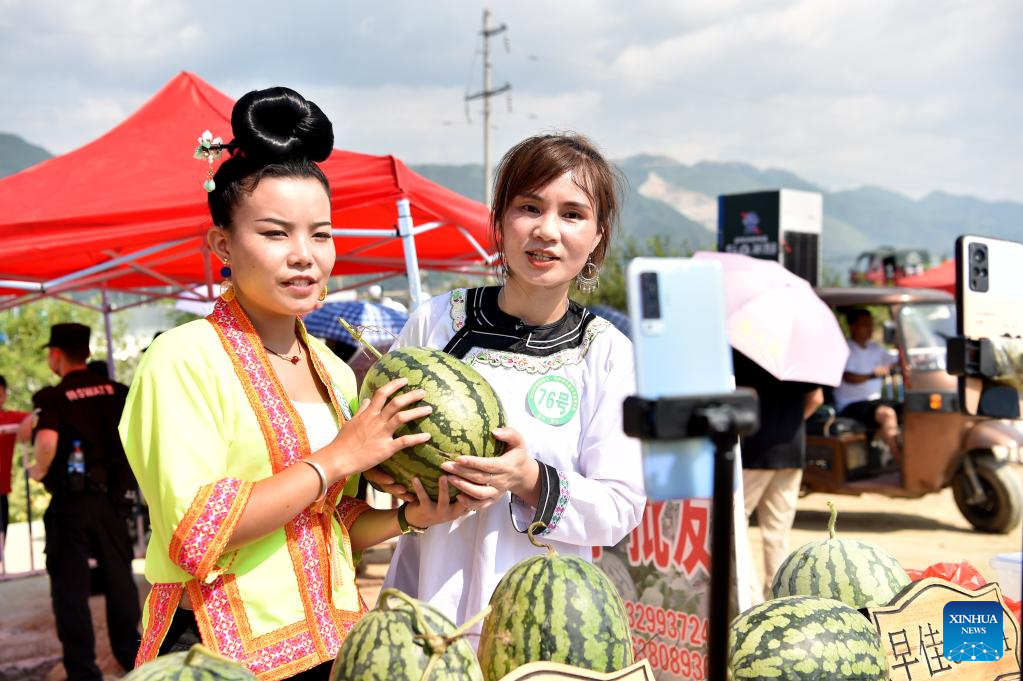Digital technologies empower China's rural revitalization drive
- By Huang Shan
 0 Comment(s)
0 Comment(s) Print
Print E-mail China.org.cn, July 25, 2022
E-mail China.org.cn, July 25, 2022

From smart agriculture to e-commerce and rural tourism to village governance, the wide application of digital technologies is changing China's countryside at an unprecedented speed.
A forum on bridging the digital divide and building digital villages was held on Saturday on the sidelines of the fifth Digital China Summit in Fuzhou city, Fujian province, to review the achievements and explore future plans.
The Chinese government has released a series of policies to advance digital village building over the past few years, striving to boost rural residents' digital knowledge and take advantage of digital technologies in advancing rural revitalization.
Smart agriculture: digital technologies make production more efficient
The scale of digital-based agriculture in Fuzhou, the host city of the fifth Digital China Summit, exceeded 6.3 billion yuan in 2021 and has become an essential part of its digital economy.
For example, Danyun township, Yongtai county, in Fuzhou, is home to a five-story automatic duck cage. Intelligent systems such as an automated environmental control system, automatic feeding and drinking, automatic excrement cleaning, and automatic egg collection make duck raising simple and convenient. It only takes one raiser to take care of 50,000 ducks.
Likewise, neighboring Zhejiang province features intelligent kiwi growing systems.
"We have cooperated with local farms in Zhejiang to monitor the growing environment, such as water quality, soil, air, and sunshine. We use big data and artificial intelligence to upgrade traditional agriculture," said Zhu Yongtao, senior vice president of ZTE.
In addition to the transformation and upgrading of agricultural production, digital technologies also guarantee the quality and safety of agricultural products.
Every day, staff members at the Xuemei agricultural production base in Changle district of Fuzhou paste exclusive QR codes on every batch of vegetables. Consumers can scan the QR codes and discover the vegetables' origin and packaging date.
Rural industries: digital technologies promote the development of new business forms
Digital application in rural areas not only improves the quality and efficiency of agricultural production but also shortens the distance between farmers, agricultural enterprises, and customers, giving impetus to the emerging new business form of rural e-commerce.
More and more farmers and agricultural cooperatives are selling their products through livestreaming on platforms such as Douyin, Kuaishou, and Taobao. Statistics show that the online retail of agricultural products reached 626.5 billion yuan in China in 2021.
Leading Chinese tech companies also contributed to rural development.
"We have helped 81 counties in 18 provincial regions in central and west China to create local agricultural product brands. We have provided digital-based inclusive loans to more than 23 million small business operators and farmers," said Yang Peng, vice president of Ant Group, at the forum.
Chinese internet giant Tencent launched a mini program based on blockchain technology to introduce 50 quality agricultural products from 32 provincial regions.
Rural talent training: digital literacy ensures sustained development
Talent is the foundation of rural revitalization. As training on "new digital farming tools" is carried out nationwide, many farmers are becoming equipped with digital skills. According to the Development Research Report of Digital Literacy and Skills in China released at the forum, 140 million farmers have received the mobile application skills training provided by the Ministry of Agriculture and Rural Affairs over the past six years.
Tencent has cultivated a group of talents for sustainable rural development through its Cultivator Program and Rural CEO Program. Zhang Lijun, vice president of Tencent, introduced that in 2021, Tencent, together with the Ministry of Agriculture and Rural Affairs, launched the Cultivator Program, focusing on personnel training for rural governance and new types of agribusiness entities. "Our target is to provide free offline training to 100,000 people in three years and free online training to 1 million," Zhang said at the forum.
In addition, the Rural CEO Program, co-launched with China Agricultural University, has completed training for 55 trainees from all over the country.
"We will fully use our digital technologies and play our due role in programs supporting digital village building and rural revitalization," Zhang said.






Go to Forum >>0 Comment(s)